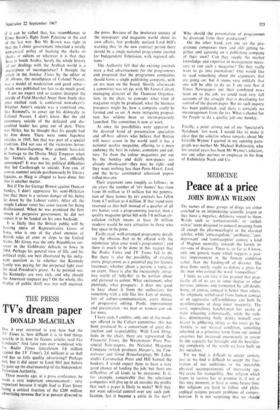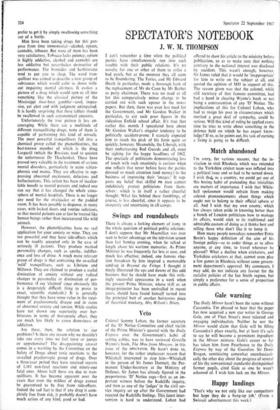Peace at a price
MEDICINE JOHN ROWAN WILSON
The names of most groups of drugs are either couched in an intimidating scientific jargon or they have a negative, defensive sound to them. Words such as 'corticosteroids' or 'anthel- mimic' seem designed to conceal meaning from all except the pharmacologist or the classical scholar, while 'anticoagulant,' antibiotic,' 'anti- depressant' and 'contraceptive' convey a kind of Maginot mentality towards the hostile in- cursions of disease. There is, so far as I know, only one generic name which suggests a posi- tive improvement in the human condition rather than the fending-off of disaster. The drug firms surely ought to donate a prize for the man who coined the word 'tranquilliser.'
I think we can take it for granted that prac- tically all of us are in some degree or other nervous, anxious and tormented by self-doubt. Some, of course, conceal it better than others. An enigmatic withdrawal from human contact or an aggressive self-confidence can both be manifestations of deep inner insecurity. The cool, supercilious hatchet-man lies awake at night wheezing asthmatically, while the ruth- less. domineering bully drinks himself ever nearer to gibbering idiocy as the years go by. Anxiety is our natural condition, something inherited in a primitive form from our animal ancestors but increased enormously in extent by dor capacity for foresight and the bewilder- ing complexity of the world we have built up for ourselves.
Yet we find it difficult to accept anxiety, just -as we find it difficult to accept the frus- tration of our ambitions or the inevitable physical accompaniments of increasing age. We crave for tranquillity. Any religion which hopes to survive has to promise it if not at this very moment, at least at some future time. But religions are hard to follow and philo- sophical systems present problems of compre- hension. It is not surprising that we should
prefer to get it by simply swallowing something out of a bottle.
Men have been taking drugs for this pur- pose from time immemorial—alcohol, opium, cannabis, tobacco. But none of them has been very satisfactory. Tobacco lacks potency, opium is highly addictive, alcohol and cannabis are less addictive but nevertheless destructive of performance. The bromides and barbiturates tend to put you to sleep. The word tran- quilliser was coined to describe a new group of substances which would calm us down with- out impairing mental alertness. It evokes a picture of a drug which would turn us all into something like the classical picture of the Mississippi river-boat gambler—cool, impas- sive, yet alert and with judgment unimpaired. It is hardly surprising that these tablets should be swallowed in such astronomical amounts.
Unfortunately the true picture is less en- couraging. While there are a multitude of different tranquillising drugs, none of them is capable of performing this kind of miracle. The most powerful tranquillisers fall into a chemical group called the phenothiazines, the best-known member of which is the drug Largactil (which the Russians used to quieten the unfortunate Dr Tkachenko). These have proved very valuable in the treatment of serious mental disorders, particularly in acute schizo- phrenia and mania. They are effective in sup- pressing abnormal excitement, delusions and hallucinations. This action has been of incalcu- lable benefit to mental patients and indeed one can say that it has changed the whole atmo- sphere of mental hospitals. There is no longer any need for the straitjacket or the padded room. It has been possible to dispense, in many cases, with locked doors and routine sedations, so that mental patients can at last be treated like human beings rather than incarcerated like wild animals.
However, the phenothiazines have no real application for your anxiety or mine. They are too powerful and they have side-effects which can be readily accepted only in the case of seriously ill patients. They produce marked personality changes, such as apathy, indiffer- ence and loss of drive. A much more relevant group of drugs is that containing the so-called 'mild' tranquillisers, such as Librium and Miltown. They are claimed to produce a useful diminution of anxiety without any radical changes in personality or diminution of per- formance. (I say 'claimed' since obviously this is a desperately difficult thing to prove to exact, scientific standards.) It is generally thought that they have some value in the twat- ment of psychosomatic disease and in states of abnormal anxiety and tension. While studies have not shown any superiority over bar- biturates in terms of therapeutic effect, they are much less likely to cause drowsiness or addiction.
Are these, then, the solution to our problems? Is there any reason why we shouldn't take one every time we feel tense or jumpy or apprehensive? The disappointing answer comes in a warning by the Committee on the Safety of Drugs about toxic reactions to the so-called psychotropic group of drugs. Over a three-year period they have received reports of 1,161 non-fatal reactions and ninety-one fatal ones. About half these are due to tran- quillisers. It has become apparent over the years that even the mildest of drugs cannot be guaranteed to be free from side-effects. Indeed the sad fact is that if any drug is com- pletely free from risk, it probably doesn't have much action of any kind, good or bad.



































 Previous page
Previous page